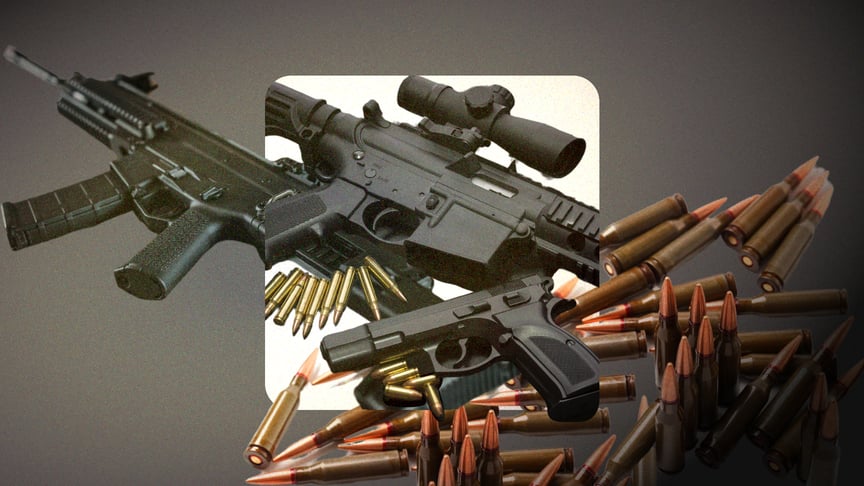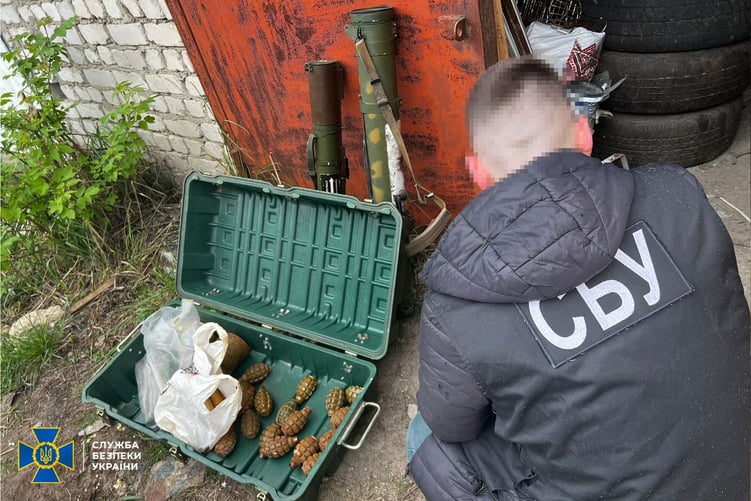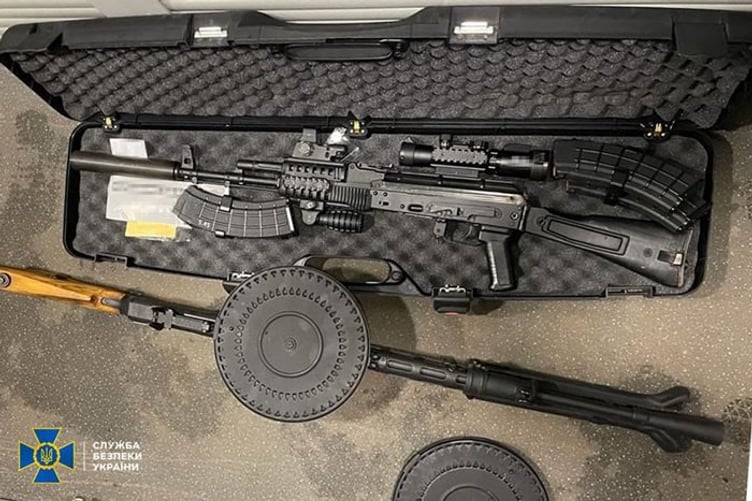"We can't confine prisons to those who possess weapons." What are the dangers posed by millions of firearms in civilian hands?

There are thousands of stories involving illegal weapon possession. Grenades, ammunition, cartridges, TNT blocks, assault rifles, and grenade launchers—according to several cases in the court decisions registry, law enforcement is not shocked by such finds. This is especially true after a hostile anti-aircraft missile system with 8 missiles was discovered in a garage belonging to two individuals.
Some people find weapons in wooded areas, others buy them illegally and set up distribution schemes, while some quietly bring home trophies from the battlefield. Overall, according to data from the Ministry of Internal Affairs, Ukrainians may currently possess up to 5 million units of illegal weapons. To bring some order to the situation, the government is actively encouraging the declaration of these weapons.
This refers to a new law concerning the declaration of weapons. But will it be effective? How many Ukrainians have voluntarily surrendered or registered their weapons? And what happens if one fails to declare? This material from hromadske discusses the "powder keg" resulting from the war, the surge in crimes, and the widespread problem that is merely the tip of the iceberg.
Millions in hand, but how many declare?
“Declare found weapons and ammunition. Store legally—avoid criminal liability,” the National Police has been sending out such SMS messages as part of an information campaign. All of this is aimed at encouraging citizens to register so-called trophy weapons.
The law on the declaration of weapons and ammunition, which civilians found during martial law, came into force only at the end of November. The essence of the law is that those who possess found or received weapons need not fear coming to a police station to declare them; after inspection, they can keep them. However, this is only valid until the end of the martial law.
This mainly concerns firearms—such as combat pistols, assault rifles, or sniper rifles of the appropriate caliber.
“This does not apply to grenade launchers, mortars, or grenades. They will definitely be confiscated. And I do not advise anyone to store them, as practice shows: either they explode somewhere, or someone throws them into someone else's yard. This already carries very serious criminal liability,” says Andrei Nebytov, Deputy Head of the National Police, in a comment to hromadske.

He describes the law as a "novelty" that has no precedent in Europe. And since it is still a "hot potato," some aspects need clarification, and others may still be improved during the process.
The law states that a person must declare their weapon within a month. I want to emphasize: this is not a month after the law comes into effect, but a month from the moment of finding it.Andrei Nebytov, Deputy Head of the National Police of Ukraine
“At the same time, this does not mean that a person who found an assault rifle in 2022 in the Kyiv region, for instance, in the de-occupied part of the Ivankiv district, thinks: ‘Well, it’s been more than two years, and I will be held accountable.’ No, I emphasize: this is new legislation, it just came into effect three weeks ago, so you can safely come and declare it, and there will be no questions,” Nebytov assures.
Before this, it was possible to avoid criminal liability, but only for voluntarily surrendering weapons to the police. Such changes were adopted immediately after the full-scale invasion. However, the statistics on voluntary surrender were low—only about a thousand units of firearms per year. The National Police is confident that the new law is performing better.
In just over three weeks, more than a thousand units of firearms have already been declared to the National Police, along with over 80,000 ammunition. And the number of requests is growing. We see effectiveness significantly higher than in all previous years, even when we held so-called voluntary weapon surrender months.Andrei Nebytov, Deputy Head of the National Police of Ukraine
However positive the dynamics may be, it remains a drop in the ocean. There could be several million units of various types of weapons in illegal circulation, while only 1.4 million are legally registered.
“We cannot fill prisons with those who possess weapons”
Law enforcement acknowledges they had to move towards a certain level of legalization to enhance control over weapon circulation. The actual scale of the powder keg we are sitting on is something that no one truly knows.
“When they mention figures ranging from 2 to 5 million, it means they have no idea how many there really are. They simply know that there are a lot of weapons. But if we talk about 5 million firearms in relation to the current population in Ukraine (let's say 27 million)—can you imagine that?” says Andrei Osadchuk, a member of the law enforcement committee of the Rada.
However, he considers such statistics to be an unavoidable consequence of a major war. The law adopted is an attempt by the Ministry of Internal Affairs to create some mechanism to encourage people to register weapons. Although the official himself doubts that this effort will work on a large scale.
Based on over a hundred analyzed cases under Article 263 of the Criminal Code of Ukraine, most accused of illegal weapon possession generally receive lenient penalties. For sincere remorse, they get conditional sentences or fines. However, this does not apply to criminal schemes and illegal distribution—then the full sanctions could apply, leading to imprisonment for 3 to 7 years.
The courts, simply understanding the mass nature and overall situation, approach this leniently. Well, we cannot currently fill prisons with people for merely possessing weapons. Yes, they possess them. Yes, that is very bad. But still, these are wartime conditions. And at the same time, a precedent has been set where the state itself distributed weapons.Andrei Osadchuk, member of the law enforcement committee of the Rada
Yet, the weapons that the state distributed to citizens in the early days of the invasion were, as the Minister of Internal Affairs assured, accounted for.
In the incomplete year of 2024, over 5200 criminal cases have been opened against those who illegally stored weapons at home or engaged in their distribution, according to data provided to hromadske by the police.
Crimes have increased 47 times
“A man was detained for storing a machine gun with ammunition in a friend's car.”
“The Security Service of Ukraine discovered another cache with combat means of destruction.”
“Police dismantled a channel for the illegal sale of weapons.”
“An unknown man fired at soldiers who were on duty.”

News with such headlines is becoming increasingly common. And all crimes, law enforcement reports, are mainly committed using illegal weapons.
As of now, in the incomplete year of 2024, 12,961 crimes committed with firearms, explosives, and ammunition have already been registered, reported Andrei Nebytov, Deputy Head of the National Police.
In 2021, according to the Ministry of Internal Affairs, there were only 273 such crimes. By 2022, this number nearly quintupled, and last year it surpassed 11,000. This means that the number of crimes this year, compared to 2021, has increased by 47 times.
At the same time, Nebytov notes: 95% of these crimes (more than 12,000) are directly related to the war and the invasion of the Russian army. This means that all military crimes, particularly those committed by occupiers, do not reflect the overall criminal situation in the state.
As for general criminal offenses involving weapons (premeditated murder, hooliganism, robbery, intentional destruction of property, etc.)—there were 617 of these committed this year. In 2021, there were 288.
“Yes, the number of these crimes has increased. But even amidst the rise in both legal and illegal weapons in the hands of citizens (including those committing crimes), this has not significantly affected the overall criminal situation,” assures Andrei Nebytov.
The state is accommodating, but then will it strike with a whip?
At the same time, according to criminal law expert Grigory Usaty, the “tension is rising,” and the increase in crimes amid such widespread circulation of undeclared weapons is inevitable. This includes both domestic and street